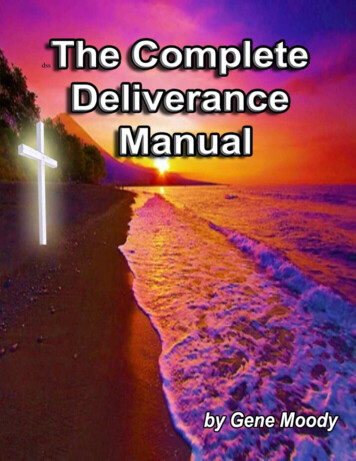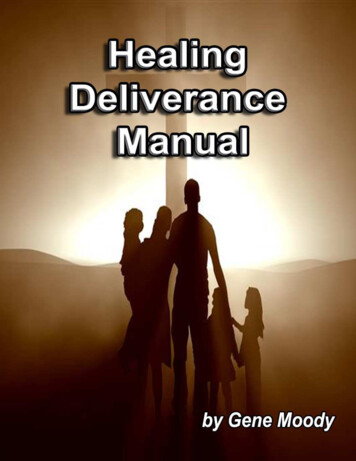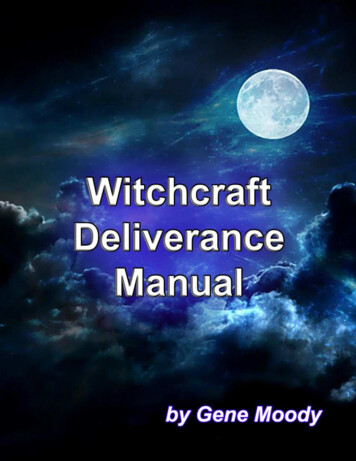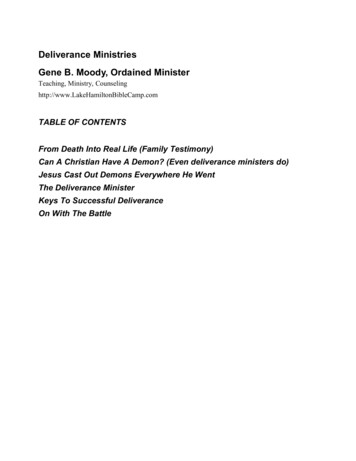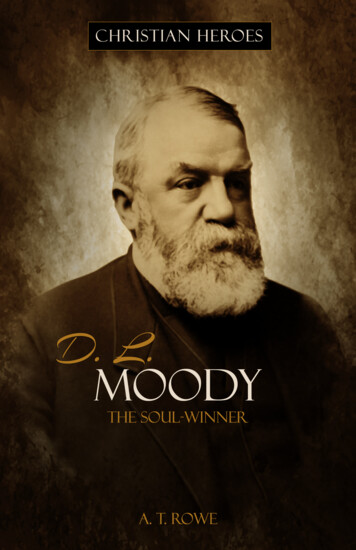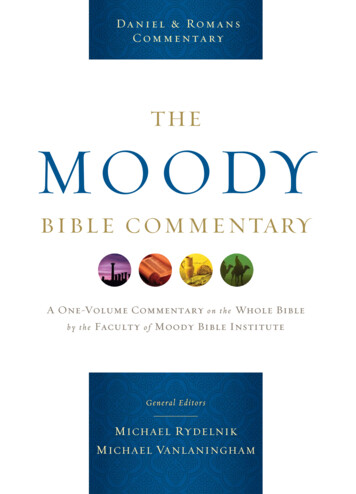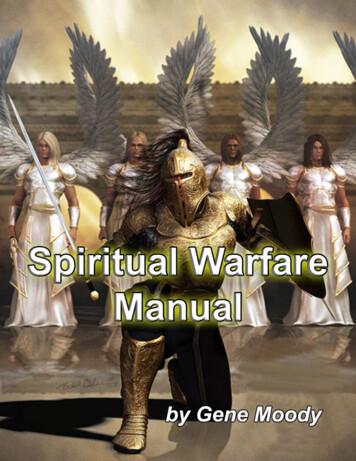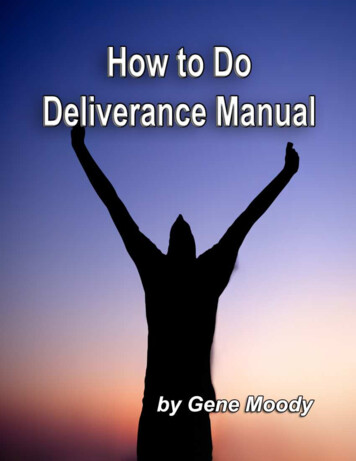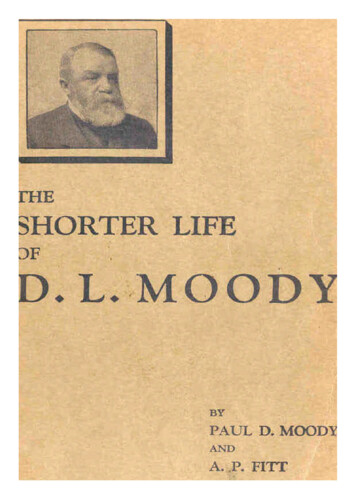
Transcription
The Shorter Life of D.L. Moody1
The Shorter Life of D.L. Moody2
The Shorter Life of D.L. Moody3
The Shorter Life of D.L. Moody4
The Shorter Life of D.L. MoodyTHE SHORTER LIFEOFD. L. MOODYBYPAUL DWIGHT MOODYANDARTHUR PERCY FITTCHICAGOThe Bible Institute Colportage Association843-845 North Wells Street5
The Shorter Life of D.L. MoodyCOPYRIGHT 1900BY THE BIBLE INSTITUTE COLPORTAGE ASSOCIATIONOF CHICAGOPrinted in United States of America6
The Shorter Life of D.L. Moody7CONTENTSCHAPTERI. EARLY LIFE AT NORTHFIELDII. BUSINESS, AND CONVERSION, IN BOSTONIII. EARLY CHICAGO CAREERIV. HOW HE CAME TO GIVE UP BUSINESSV. MISSIONARY AND PASTORAL LABORS IN CHICAGOVI. HOW MR. MOODY PREPARED HIS SERMONSVII. THE CIVIL WAR PERIODVIII. FARWELL HALL ACTIVITIESIX. FIRST VISIT TO ENGLAND AND THE CONTINENT IN1867X. HOW MOODY AND SANKEY CAME TOGETHERXI. THE CHICAGO FIRE, AND AFTERXII. SECOND VISIT TO ENGLAND, 1872XIII. GREAT ENGLISH CAMPAIGN, WITH MR. SANKEY,1873-75XIV. BIRTH OF THE MOODY AND SANKEY HYMNBOOKS, 1873XV. RETURN TO AMERICA, AND THE GREAT MEETINGSIN THE 70'sXVI. D. L. MOODY AS AN EVANGELIST-HIS CHARACTERISTICS AND METHODS, BY C. I. SCOFIELD, D.D.XVII. DAILY LIFE AT NORTHFIELD, AS CITIZEN ANDNEIGHBORXVIII. VISIT TO THE HOLY LANDXIX. FACING DEATH ON THE ATLANTICXX. WITHIN THE FAMILY CIRCLEXXI. LAST EVANGELISTIC MISSIONXXII. CORONATION DAYXXIII. LAID AT 111115
The Shorter Life of D.L. Moody8
The Shorter Life of D.L. Moody9Shorter Life of D. L. MoodyChapter IEarly Life at Northfield"Some day you will read in the papers that D. L. Moody, ofEast Northfield, is dead. Don't you believe a word of it! At thatmoment I shall be more alive than I am now. I shall have goneup higher, that is all; gone out of this old clay tenement into ahouse that is immortal, a body that death cannot touch, that sincannot taint, a body like unto His own glorious body. I was bornof the flesh in 1837. I was born of the Spirit in 1856. That whichis born of the flesh may die. That which is born of the Spirit willlive forever."Those are the words of D. L. Moody—his autobiographycompressed into a few sentences. Between his birth in the fleshon February 5, 1837, and his departure to be with Christ onDecember 22, 1899, there were crowded more, and more varied,experiences than fall to the general lot of men; and he firmlybelieved to the last that the opening portals of heaven would onlyadmit him to larger and truer service for his God and Savior inunseen worlds.By the grace of God he was what he was; but his life waslargely influenced, under God, by his mother. Betsey Holton wasborn February 5, 1805. She came of old Puritan stock that hadsettled in Northfield, Massachusetts, as early as 1673. Shemarried Edwin Moody on January 3, 1828. He was a mason bytrade.They had a comfortable home in Northfield, with an acre ortwo of land. Seven children were born to them, of whom DwightLyman Ryther was the sixth, born on February 5, 1837.On May 28, 1841, young Dwight was at school. A neighborput his head in at the window, and asked if any of Ed Moody'schildren were there, saying that their father had just diedsuddenly. That morning he had gone about his work as usual; but
The Shorter Life of D.L. Moody10a pain in his side sent him home to rest. About one o'clock in theafternoon he staggered to the bed, and was found dead a fewminutes later, kneeling beside it as if in prayer.The death of his father was the earliest thing that Dwightcould remember. He could recall nothing about the funeral, butthe shock of the sudden death made a lasting impression on him.The widow was left in trying circumstances, which,however, only served to develop her sterling and heroiccharacter. Her eldest child was only thirteen years old. Twinswere born a month after her husband's death. He died a bankrupt,and she had no one on whom she could lean heavily for support.When the neighbors would come in and tell her to bind outher children, she would say:"Not as long as I have these two hands.”"Well," they would say, "you know one woman cannot bringup seven boys. They will turn up in jail, or with a rope aroundtheir necks."She toiled on, and none of her children went to jail, and nonehas had a rope around his neck."If every one had a mother like that mother," said Mr.Moody on the occasion of her funeral, "if the world wasmothered by that kind of mother, there would be no need forjails."The creditors swept away nearly everything, even thekindling. Once when there came on a snowstorm, she had tomake the children stay in bed next morning until school-time, forwant of wood to make a fire.She was always bright and cheerful in the presence of herchildren, but that first year after her husband died she weptherself to sleep every night. Her sorrows drove her to God, andshe claimed His promises for the fatherless and the widow.In spite of all its privations, home was the sweetest place onearth to the Moody children, and as long as that mother remainedon earth, occupying that same home, but with all the comforts shedesired, Dwight and her other children were drawn thither by thestrong bands of love.Dwight's early life differed little, in the main, from that ofthe ordinary New England boy. He continued to go to school in
The Shorter Life of D.L. Moody11the winter, and learned the three r's and a little algebra. In thesummer he "hired out." The first thing he did to earn money wasto turn some neighbors' cows out to pasture on a mountain nearby, receiving a cent a day as wages.Many anecdotes are told that prove that he was full of funand loved practical jokes—a characteristic that he retainedundiminished to the end. They indicate also those qualities ofleadership which were so marked a feature of his later career.At the closing exercises one school term, the boys gaverecitations and dialogues. Dwight chose Mark Antony's orationover Caesar's body as his piece. He brought a box with him toserve as a coffin, and put it on the table. The audience, whichincluded the local ministers, school committee, teachers, parents,and friends of the children, was moved to tears as he proceeded.Presently he lifted the cover of the box to take a last look atCaesar, and out jumped a tomcat!"Scat!" shouted Dwight; and great was the uproar andlaughter.Some of the boys brought a pail to the cider-mill oneafternoon, but not wishing to be seen carrying the cider home bydaylight, they left it on one side until they should return later.Dwight had watched them, and when they were gone he got thepail and brought it home. One of his brothers thought he wouldadd to the joke, so when supper-time came he filled a glass withvinegar and set it at his own place at the table. Dwight fell intothe trap. Supposing that his brother had helped himself to thecider, he reached over and proceeded to drink to the toast:"Here's to the health of George Washington!"But he enjoyed the joke himself.On one occasion he wrote a notice summoning a temperancemeeting in the schoolhouse on a given date, and signed a certaindeacon's name in disguised handwriting. There was a crowdedattendance, but no speaker appeared.In that school district there were two parties. One party saidthat boys could not possibly be controlled without the cane, andthey kept a schoolmaster who acted on their plan; the other partysaid they should be controlled by love. The struggle went on, andat last, on one Election Day, the first party was put out and the
The Shorter Life of D.L. Moody12other ruled in their stead. The boys said to each other that theywere going to have a grand time that winter. There would be nomore corporal punishment; they were going to be ruled by love.The new teacher was a lady, and she opened the school withprayer. The boys hadn't seen that done before, and they wereimpressed, especially when she prayed that she might have graceand strength to rule with love. School went on for several weeks,and they saw no rattan.Dwight, always the ringleader, was one of the first to breakthe rules. The teacher asked him to stay behind. He thought thecane was coming out again, and was in a fighting mood. She tookhim alone, sat down, and began to talk to him kindly. That wasworse than the cane; he did not like it. She said:"I have made up my mind that if I cannot control the schoolby love, I will give it up. I will have no punishment. If you loveme, try to keep the rules."Love conquered him, and he became a firm ally of thatteacher.When he was about eight years old, an incident happenedthat he ever afterward spoke of with gratitude. One of his elderbrothers went to the town of Greenfield, twelve miles away, towork in a store for his board and attend school. He was so lonelythat he found a place for Dwight. The incident can be best relatedin Mr. Moody's own words:"One cold day in November my brother came home, andsaid he had a place for me. I said I wouldn't go; but after it wastalked over, they decided I should. That night was a long one."The next morning we started. We went up on the hill andhad a last sight of the old house. We sat down there and cried. Ithought that would be the last time I should ever see that oldhome. I cried all the way down to Greenfield. There my brotherintroduced me to an old man who was so old that he could notmilk his cows and do the chores, so I was to do his errands, milkhis cows, and go to school I looked at the old man, and saw hewas cross. I took a good look at his wife, and thought she wascrosser than the old man. I stayed there an hour, and it seemedlike a week. I went around then to my brother, and said:" I am going home.'
The Shorter Life of D.L. Moody13" What for?'" I am homesick.'" Oh, well, you will get over it in a few days.'" I never will. I don't want to.'"He said: You will get lost if you start for home now; it isgetting dark.'I was frightened then, and I said: I will go at daybreak tomorrow morning.'"He took me to a shop window where they had somejackknives and other things, and tried to divert my mind. Whatdid I care for those old jackknives? I wanted to get back home tomy mother and brothers; it seemed as if my heart was breaking."All at once my brother said: Dwight, here comes a manthat will give you a cent.'" How do you know he will?' I asked." Oh, he gives every new boy that comes to town a cent.'"I brushed away the tears, for I wouldn't have that man seeme crying, and I got right into the middle of the sidewalk, wherehe couldn't help but see me, and kept my eyes right on him. Iremember how that old man looked as he came tottering downthe sidewalk. Oh, such a bright, cheerful, sunny face he had!When he came opposite to where I was, he stopped, took my hatoff, put his hand on my head, and said to my brother:"This is a new boy in town, isn't it?'" Yes, sir, he is; just came to-day.'"I watched to see if he would put his hand into his pocket. Iwas thinking of that cent. But he began to talk to me so kindlythat I forgot all about it. He told me that God had an only Son,and He sent Him down here, and wicked men killed Him; and hesaid He died for me."He talked only five minutes, but he took me captive. Afterhe had given me this little talk, he put his hand into his pocketand took out a brand-new old-fashioned cent, a copper thatlooked just like gold. He gave me that. I thought it was gold, anddidn't I hold it tight! I never felt so rich before or since. I don'tknow what became of that cent. I have always regretted that Ididn't keep it; but I can feel the pressure of that old man's hand on
The Shorter Life of D.L. Moody14my head today. Fifty years have rolled away, and I can hear thosekind words ringing yet. I never shall forget that act."At the age of sixteen, when he was still considered a smallboy, he was taken one night to a lyceum meeting, where thetownspeople had a debate. Toward the close of the meeting,when feeling was running high, he stood up, and in a few pointedimpromptu sentences proved the weaker side in the debate to beright, and changed the current of the whole meeting.He was immediately appointed leader of the next lyceummeeting, by acclamation, and went home feeling proud.He selected as subject for the coming meeting the wrongs towhich the Indians were subjected. He wrote out a speech of ten orfifteen minutes' duration, and for days his mother heard himtramping back and forth in his bedroom as he memorized thisspeech. When at last he appeared on the platform he recited thefirst few sentences, but memory failed him in his excitement, andhe closed abruptly with the remark:"The Indians went to the North Pole, and got froze up as stiffas steelyards."Not long ago he comforted a student of Mount HermonSchool, of whom much had been expected, but who broke downduring his final oration, by saying:"Never mind! I broke down the first time I tried. You willget through next time."Naturally, the reader will inquire if Dwight showed anyspecial aptitude in a religious direction during these early years.The answer must be no.His mother was a religious woman—that quiet, homereligion that characterizes New England. She was then aUnitarian of the Channing school, differing very little in herbeliefs from orthodox Congregationalists, and apparently havinga vital faith in the widow's God. Northfield is not far from thescene of Jonathan Edwards' revival labors, but the wave of hisinfluence did not reach the Moodys.About the only books in the home were a Bible and a bookof devotions. Every morning Mrs. Moody read to her childrenfrom these. On Sunday all the children were sent to the Unitarianchurch, over a mile away, and they stayed through Sabbath-
The Shorter Life of D.L. Moody15school. It was never a debatable question whether they should goor not. The boys used to go barefoot, carrying their shoes andstockings in their hands, and only putting them on when theycame in sight of the church.Mr. Everett, pastor of the Unitarian church, was very kind tothe widow Moody in the days of her trial. At one time Dwightboarded with him and did his chores. But attendance at theSunday services was irksome. Dwight could not understand thesermons. In fact, Sunday was a day the boys disliked, and atsundown—they began to observe Sabbath at sundown onSaturday in those days—they would run out and throw up theircaps, and let off their jubilant spirits.The only water baptism D. L. Moody received was at thehands of this Unitarian minister, but it was in the name of Father,Son, and Holy Ghost.His mother tried to induce him to pray, but he said he hadtried it, and it didn't work. Once, however, when he was about sixyears old, a rail fence fell over on him, He could not extricatehimself, and his cries for help were in vain, as he was too faraway from any house. But he happened to think, "Maybe Godwilt help me." So he prayed in his extremity, and believed thatGod answered his cry, as he was presently able to lift away therails.One lesson the mother taught the boys was, that their word,once given, like the laws of the Medes, altered not. No excusewould ever be accepted for failure to perform a promise. Thequestion she always asked was, "Did you say you would?" not,"Can you?" Once, when Dwight went to his brother George andsought release from an agreement to work for a neighbor for hisboard during the winter while he was also attending school, thecase was carried to their mother. Dwight's cause of complaintwas that for nineteen consecutive meals his only food had beenmilk and cornmeal, varied occasionally by the addition of someold crusts that were too hard for the family. When his motherfound that he had enough to eat, such as it was, Dwight was sentback to keep his agreement.Nothing that is recalled of his boyhood gives any reason toexpect the large things that followed in Mr. Moody's life. But his
The Shorter Life of D.L. Moody16love of harmless fun, his keen appreciation of a joke, even uponhimself, his sensitive, compassionate nature, and his leadership ofboy comrades, were features which remained with himthroughout the years that followed.Chapter IIBusiness and Conversionin BostonAs Dwight grewolderhebecameambitious for a change.The confines in which hefound himself were toonarrow. He began toappreciate the value ofeducation, and tried tomake the most of hisschooling opportunities.One day in thespring of 1854, when hewas up in the woodscutting and hauling logs,he said to his brotherEdwin, who was withhim:"I'm tired of this. I'm not going to stay round here anylonger; I'm going off to get some other work."He had two uncles in the boot and shoe business in Boston,of whom he sought work, but with little encouragement. Finallyhe left Northfield and went to Clinton, Massachusetts, whereanother brother was employed. He got a job in a stationery andbookstore, addressing wrappers for the first paper issued in thattown; but he wasn't satisfied. Soon he went to Boston, where hehad a homesick and trying time seeking work and finding none.At last he approached his uncles again, and was probably in sucha condition that they were able to make their own terms with him.
The Shorter Life of D.L. Moody17They agreed to take him into their store if he would promise toboard at a place selected by them, to attend the Mount VernonChurch and Sabbath-school, and not to drink or gamble.Dwight accepted the terms, and became the store boy, to doodds and ends. His ambition now was to make one hundredthousand dollars, and be a successful merchant. He spent hisspare moments learning the prices of goods, and quietlyfamiliarizing himself with the details of the business.Although he was little acquainted with city ways and citymanners, it soon became evident that he made up for deficienciesin polish and externals by a natural wit and brightness that liftedhim out of his lowly position and brought him to the front as asalesman.Letters that he wrote home at this time show that his boyishheart turned constantly toward Northfield. A postscript to a letterwritten to his mother on August 22, 1854, is characteristic of hiscorrespondence. "Ho, George," he wrote, addressing his elderbrother, "tell me what kind of a crop of corn this year, andpotatoes also."Nor did business so engross his attention as to crowd out theold tendency and liking for practical jokes. Before he had been inthe store long, he settled on a tall cobbler, to plague him. One dayhe slit the leathern seat of this cobbler's box, and placed a basinof water underneath. When the cobbler sat down, of course he gotwet. This was repeated three times before the cobbler kicked thebox over to see what was the matter. Immediately he grabbed aknife and started for young Moody, who was waiting oncustomers in the front part of the store. Moody was taking it allin, and rushed out into the street when he saw the cobblercoming.One evening when he was aching for fun a young man abouthis own age came along the sidewalk just as he was leaving thestore. Moody stepped to his side and walked along with him,looking into his eyes all the time. The young man hurried; so didMoody. Finally the other commenced to run, and Moody kept upwith him until the young man was thoroughly scared.He had his share in all the legitimate excitement of the city.The abolition cause appealed strongly to him, and he attended
The Shorter Life of D.L. Moody18stirring meetings in Faneuil Hall. He took part in the attack on theold court-house to free the slave Anthony Burns. He used to tellhow they took great planks to stave in the door, but when thesoldiers fired and the crowd smelt powder, they backed away.His first definite spiritual experience came to him during hisstay in Boston-his conversion.Attendance at church and Sabbath-school was obligatory,under agreement with his uncle. But it was merely formal at first.There was many an Eliab, Abinadab, or Shammah on whom theanointing of the Spirit would more likely come than on thisDavid.Mount Vernon Church was organized as a revival church,particularly to retain in Boston the fiery eloquence, holy zeal, andglowing fervor of Dr. Edward N. Kirk—just such a church as Mr.Moody's own church in Chicago later became. But the earnest,cultured addresses of Dr. Kirk did not reach young Moody. It issaid that he chose a seat in one of the obscurest pews in thegallery, and that, wearied with the hard work of the week, heused to sleep most of the time during the Sunday services.In the Sabbath-school he was placed in a class taught byEdward Kimball. The teacher handed him a Bible, and told himthe lesson was in John. Moody took the book, and hunted allthrough the Old Testament for John. The other young men(among whom were some Harvard students) detected hisignorance, and nudged each other. The teacher saw hisembarrassment, and found the place for him. "I put my thumb inthe place and held on," said Mr. Moody afterward; "I said thenthat if ever I got out of that scrape, I would not be caught thereagain." An incident that exhibits not merely his ignorance of theBible, but also his dogged purpose to learn from his mistakes.He gave close, respectful attention to his teacher from thefirst, and his demeanor in class was always earnest, quiet, andattentive. He seldom said anything. Once, when Mr. Kimball wasteaching about Moses, trying to show that he was a man of selfcontrol, wise and statesmanlike, who would have been at thehead of affairs in any age or nation, Moody asked, withhesitancy:"Mr. Kimball, don't you think Moses was smart?"
The Shorter Life of D.L. Moody19This word from his limited New England countryvocabulary truly expressed Mr. Kimball's idea, and proved thathe was anxious to grasp his teacher's meaning.Before long, Mr. Kimball determined to speak to his newscholar about his spiritual condition. He went to Holton's shoestore one day, and found Moody in the back part of the storewrapping up shoes in paper and putting them on the shelves. Mr.Kimball told him of Christ's love and sacrifice. Evidently theyoung man was ripe for the gospel message, although he hadhardly felt that he had a soul till then. The light of heaven flashedupon him, and never afterward grew dim.How tenderly Mr. Moody used to refer to that transactionbetween himself and his Savior! Preaching in Tremont Temple,early in 1898, he said:"I can almost throw a stone from Tremont Temple to thespot where I found God over forty years ago. I wish I could dosomething to lead some young men to that same God. I wish Icould make people understand what He has been to me. He hasbeen a million times better to me than I have been to Him."At other times he used to say: "The morning I was convertedI went outdoors and fell in love with everything. I never loved thebright sun shining over the earth so much before. And when Iheard the birds singing their sweet songs, I fell in love with thebirds. Everything was different."The natural zeal and energy of the man at once sought tofind expression in service for the new Master whose cause he hadentered. One of the first things he did was to go before the churchcommittee with a view to joining the church. He was then onlyeighteen years old. He had been in Mr. Kimball's class only a fewmonths. The committee was composed of earnest, sympatheticmen (among them Mr. Kimball), who made the examination verycarefully and gently, knowing young Moody's limited knowledgeand hesitation. The questions had to be shaped so that theanswers would be simply "yes" or "no." At length one of thedeacons asked:"Mr. Moody, what has Jesus Christ done for you, and for usall, that specially entitles Him to our love and obedience?"
The Shorter Life of D.L. Moody20The question embarrassed him. It was too long and toowordy for him to answer promptly, but he said:"I think He has done a good deal for all of us, but I don'tthink of anything He has done in particular as I know of."Nothing, therefore, was elicited at this examination thatcould be considered satisfactory evidence of conversion. Underthe circumstances the committee deferred recommending him foradmission to the church, but three of their number wereappointed to take care of his case, and to seek to open up to himthe way of God more perfectly. When he came before thecommittee again, no more doctrinal questions were asked of himthan previously; but his earnest desire to be among God's people,and the feeling that he would get more good in the church thanfrom being either refused or delayed admission, and theconviction that he would do no harm in the church anyway,although he was still unable to give any intelligent information asto his religious experience—these reasons led to his beingrecommended for membership in May, 1856.Mr. Moody never complained of the action of the committeein this case. On the contrary, he thought they had done the wiseand proper thing. He was very solicitous in later years aboutpersons being admitted to membership in our churches withouthaving really been "born again," and directed his efforts to bringmen and women face to face with this question, to see not only ifthey had become partakers of the divine nature, but also that withPaul they should be able to say, "I know whom I have believed,and am persuaded that He is able to keep that which I havecommitted to Him."Stories are current-whether true or not it is impossible toverify in every case, although in some instances they are knownto be false-of one and another trying to rebuke young Moody forspeaking at prayer meetings, and seeking to repress his zeal. Itcan easily be credited that he was whole-hearted and active inreligion just as he was in other things. But Mr. Kimball, whoseloving interest in his Sabbath-school pupil never abated, says thatwhile Moody attended the Friday evening church prayermeetings quite regularly, he has no recollection of hearing himspeak except a few times, when he was invited by the leader of
The Shorter Life of D.L. Moody21the meeting to take part. "I can truly say (and in saying it Imagnify the infinite grace of God as bestowed upon Mr.Moody)," wrote Mr. Kimball, "that I have seen few personswhose minds were spiritually darker when he came into mySabbath-school class, or one who seemed more unlikely ever tobecome a Christian of clear, decided views of gospel truth, stillless to fill any sphere of extended public usefulness." Dr. Kirkand the church officers lived to thank God for Mr. Moody'smarvelous development in grace and in the knowledge andservice of our Lord and Savior Jesus Christ.Chapter IIIEarly Chicago Career"CHICAGO, September 20, 1856.—I reached this far-famedcity of the West one week ago, in the night.I went into a prayermeeting last night, and as soon as I made myself known I hadfriends enough. After meeting they came to me, and seemed to beas glad to see me as if I were their earthly brother. God is thesame here as He was in Boston, and in Him I can find peace.Iwish you could have seen a couple of ladies that came on withme. I was introduced to them at the depot at Boston. They wereso good Christians. They stayed here until Friday night, and thenwent south, and I felt as if Christ was the only friend I had inChicago. But since then I have found some nice people."These extracts are from the first letter D. L. Moody wrote tohis mother after reaching Chicago.His ambition had been stirred by the opening up of the greatWest. Boston proved too conservative for him. He was notcomfortable in his surroundings, and privately decided to strikeout where there was more room for a young man with push andenthusiasm to succeed in business. His home folks were opposedto his going to the then far-away city of Chicago, but he wrote hismother that if God would bring him there, he would devote hiswhole life to God's service. While he undoubtedly did not meanthis to imply giving up business, as his ambition was still to
The Shorter Life of D.L. Moody22become a successful merchant, it shows how ready he was tofollow God's leading, and make his whole life tell for Christ.After reaching Chicago, he secured employment inWiswall's boot and shoe store. Though personal appearanceswere still against him, his ability as a salesman soon asserteditself. He became popular with the rougher class of customers,and used to take especial delight in handling difficult people.After a time, when Wiswall added a jobbing department tohis business, Moody found himself still more in his element. Itgave him a chance to push out in his own interests, to exercise histireless energies outside the routine of the store. He used to visitthe depots, and inspect the hotel registers for incoming visitors.When the store closed at night, he would accost passersby and tryto sell them rubbers or other seasonable goods. He was all thetime on the lookout for customers.On December 16, 1856, he wrote his brother Samuel atNorthfield as follows:"I suppose you would like to know how I am doing. Well, Iam doing first-rate. Shall be on there in the summer, if not before.I came very near going last week. A man offered to pay my fareon if I would go with him to buy some goods, but Mr. Wiswallwas so driven for help that he could not spare me. I should like tocome back to the Bay State once more. Things don't look out heremuch as they do in Boston. A good many of the stores are keptopen on the Sabbath-day. It is a great holiday out here."The same day he wrote his mother:"I have made thirty dollars a week ever since I came outhere. Don't let Uncle Samuel get hold of it, but as it has turnedout, I have done the very best thing in coming out here. Myexpenses are a good deal, but I can make more money here thanin Boston. I will send you a bill of fare of the house where Iboard, and then you can judge whether I shall starve or not."One joke that Mr. Moody used to tell about himself withgreat enjoyment occurred at this period.It was during President Lincoln's first presidential campaign,and Mr. Moody was traveling through Southern Illinois. The
home. I cried all the way down to Greenfield. There my brother introduced me to an old man who was so old that he could not milk his cows and do the chores, so I was to do his errands, milk his cows, and go to school I looked at the old man, and saw he was cross. I took a good look a
